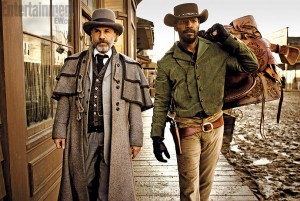Django Unchained
Posted on December 24, 2012 at 6:00 pm
 How do you solve a problem like Tarantino?
How do you solve a problem like Tarantino?
The prodigiously talented writer/director is a master of style, sensation, and a uniquely muscular kind of cinematic storytelling that builds on a stunning ability to mash up high and low art in a singular and wildly entertaining combination shot through with pure cinematic testosterone and filled with saucy variations on dozens of other films.
But then there is the content of the films, which it seems that Tarantino looks at as just another tool for jacking up a movie’s adrenalin. In “Pulp Fiction,” there was the shock of a literal shot of adrenalin to the heart of an overdosing character and the frisson of hired killers whose biggest concern about blowing someone’s head off is the challenge of getting the blood off the car upholstery. The purest expression of Tarantino’s art is in the “Kill Bill” movies, where he wastes no time on plot, just the minimum nod to the simplest and most relatable of motives — revenge.
In “Django Unchained,” as in his last film, Tarantino uses an actual historic atrocity almost as an afterthought or a placeholder. Like The Bride’s revenge motive, the Holocaust and slavery — and endless uses of the n-word by both black and white characters — are used to justify massive carnage, and, apparently, for no other reason. With “Kill Bill,” the less we knew about the specifics of the reason for the revenge, the better. With “Inglourious Basterds” and “Django Unchained,” we are already aware of the horrors that give the characters license to wreak destruction (artfully). But it is, ultimately, empty. Put another way: sound and fury, check. Signifying: nothing.
Foxx plays the title character. As the movie begins, slave dealers are marching a group of slaves in leg irons and with the scars of whip marks along their backs, through the wilderness. A cheerful man with an elegant, cultured manner pulls up in a cart with a big tooth mounted on a spring. He is passing as a dentist. He cordially offers to buy a slave but when the brutish, dull-witted men refuse, and the first massive slaughter of the story is underway, and all the other slaves set free. The man is Dr. King Schultz (Christoph Waltz, who won an Oscar as a Nazi for Tarantino’s “Inglourious Basterds”). He is a bounty hunter who hunts down “wanted dead or alive” men and kills them to collect the reward. In those pre-Google image search days, he needs Django to identify three brothers. The information on the wanted posters is not enough for a positive identification. He is opposed to slavery, so he makes a deal. He will keep Django a slave only long enough to complete the job.
Django proves so adept at the bounty hunter business that Schultz offers to bring him on as a partner. “Kill white people and get paid for it? What’s not to like?” Django replies. Django wants to rescue his wife, Broomhilda (Kerry Washington). When they tried to escape from their owner, they were separated and sold. Schultz says that Django will not be able to do it alone, and promises to help him get her back. Their travels take them through several different adventures and many nods and winks to other films (Franco Nero, the original Django, shows up in a brothel bar), including a completely hilarious scene with a bunch of proto-Klan types who can’t get the eyeholes right in their masks and some completely horrifying scenes with a slave torn apart by dogs and a seemingly endless “mandingo fight” to the death. Broomhilda is now owned by a man named Candy (his plantation is called Candyland). He is utterly corrupt and despicable, but even worse is his house slave (Samuel L. Jackson), because he betrays other slaves.
Tarantino gets top marks for style, as always. The violence and historical reversals are possibly intended to be empowering (oddly, Broomhilda is surprisingly less powerful than the usual Tarantino female characters). On the contrary, it is dispiritingly disrespectful to the people who suffered unspeakable atrocities. And Tarantino’s increasing distance between style and substance grows less palatable with each film.
Parents should know that this film includes extremely brutal, graphic, bloody, and disturbing violence with many characters injured and killed, an extended fight to the death, whipping and torture, prostitutes, slaves, some nudity, and constant very strong language including many uses of the n-word.
Family discussion: Why did Stephen tell Calvin his suspicions about Django? How does this movie show the influences of spaghetti westerns, American westerns, and “Blazing Saddles?” Any other inspirations?
If you like this, try: “Inglourious Basterds” and “Kill Bill”
